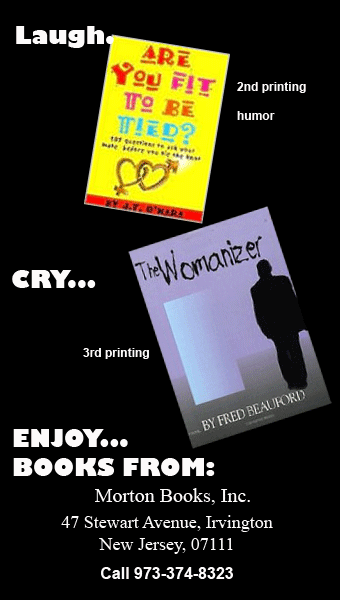NOVEL
The African Gentleman
…and The Plot to Re-establish The New World Order
A Novel by Fred Beauford
Chapters 12-16
12
As I later pondered Gladys' story, and my reaction to it, I realized that I had acted in a manner I had promised her I wouldn't. My hopes of being a leading man in her next novel had been severely diminished. When I visit Assai later this week at the detention center where he was being held, I will add this to the many questions I have for him.
13
My brief talk with Assai was barely worth the trip. He was still being held on what I now know are conspiracy charges but I remain in the dark as to what he was conspiring to do. I do know that our company was not implicated, and thank the Lord, or whoever else, we are carrying on the best we can without his considerable leadership.
His message to me was blunt and to the point.
"Don't ever visit me here again, sir," he said.
This time he didn't evade my eyes, but stared directly at me. I was struck, and slightly intimidated, by the anger I saw on his face, and in his eyes, and heard in his voice.
It was a strong, direct, bitter, and hatred-filled voice that I had never heard from him before.
"Why?" I asked, as if I had not already grasped why.
"Do you want them chasing after you, following you, questioning your friends, listening to your calls, infiltrating your house of worship; do you want to live knowing that you have eyes and ears on you all day and night? Is that what you want, sir?"
For the first time since I have known him, I felt that I knew nothing about the person sitting behind the thin glass partition that separated us.
14
But he was right, as I explained to Gladys the next time we met. This time we were sitting in the bar on Second Avenue that served as the setting for her novel, The Queen of Second Avenue. I had finally finished her book after all these months, and it seemed so real to me that I wanted to go there with her to meet some of the wild people she wrote about, and just perhaps, if I was lucky, to meet the Queen herself.
I sensed over the phone that she was very reluctant to take me to that bar, but I persisted. I had to see for myself just what kind of environment could produce so much drama.
"Listen, Jamison," she warned me as we made our way down Second Avenue toward the bar, "it's a novel. I made shit up. I just used the bar as a setting. People here are just as dull as they are in any other bar in this city."
"You mean there's no "Queen of Second Avenue?" I asked. I was thinking about the woman who was at the center of all the fuss.
Gladys smirked at me. I mean, really smirked at me.
"Jamison, sometimes I don't know about you. I see you know little about writing novels," she said.
15
It seemed to me when we finally walked in the door, that Gladys seemed a bit nervous. "You know I haven't been in this bar in a long time." she said, looking around the large room with the extra-long bar. A few people waved at her as we walked over to the bar and took seats and ordered drinks.
The people sitting at the bar were the usual older white men that one expected in bars like this.
The lone younger man yelled out, "Hey, long time no see!"
There were no women in the place, so there was no one even vaguely resembling the woman I read about in her book. That woman was a 52-year-old man killer. She especially loved older married men. Gladys had a hilarious scene in The Queen of Second Avenue, where a short, pudgy, balding Jewish man, and a tall, "light skinned" black man with short, graying dreads, began shouting, and pushing and shoving each other.
The Jewish man had suddenly erupted, startling everyone in the crowded bar. "You stay away from her, you hear!"
"Oh, go home to your ugly old wife, old man!"
"You go home to your wife! Who the fuck you calling an old man! I'll show you who's an old man."
The bartender had to come from behind the bar and separate the two men as they huffed and puffed trying to gain a physical advantage over the other.
A chapter later, The Queen of Second Avenue took a dark turn, a very dark turn indeed. That tall, light skinned black man, with the graying little dreads who had walked proudly out of the bar with the Queen, having put his rival in his place, was soon found brutally murdered at the college where he taught.
They found him slumped over his personal information station, his blood splattered all over the room. This was a classic hit job. His head was half blown off and obviously a silencer had been used because no one heard the single shot to the back of his head.
But the Asian hit man should have known better than to shoot him at his college. These days we even have cameras in broom closets, especially in schools. Police quickly found the man, and just as quickly arrested the Jewish man at the bar on Second Avenue for hiring him.
"He was just sitting there at the bar, nursing a cool Cosmo, a rare treat, and wondering if this was the last one he would ever have, when two rather dour looking men walked in and the bartender pointed in his direction," wrote Gladys in her novel.
I call him the Jewish man not out of any kind of disrespect, or ethnic finger pointing, but because Gladys never named him, instead calling him "the Jewish man" throughout her novel. In fact, if I remember correctly, she rarely names any of her characters. A stylized quirk, I suppose.
Nevertheless, the trial of the Jewish man turned into one of the biggest trials in the history of The City; and the middle-aged temptress at the center of it all, was soon crowned by all the tabloids, "The Queen of Second Avenue."
16
When I finished reading that key chapter of the jealous "Happy Hours" fueled barroom encounter between the Jewish man and the tall African American, which led to the gruesome murder in Gladys' novel, I felt tears come to my eyes, thinking about all of the chaos that can come from one human being wanting something so desperately from another human.
I had been there.
There were times when I was at the height of my despair over losing Angel to that damn African American bastard; that I had strong fantasies of busting into their love nest in the hills, and blowing both of them away.
I didn't know their exact address, but I would drive around the Hollywood Hills imagining that they lived in a large house right off of Overview Drive. I would park right outside the door I imagined to be theirs, waiting to see if they would come out of the house, as violent images coursed through my mind.
The third time I was there, an armed private security service pulled up in back of me.
A Hispanic woman got out of her car. I noticed that she unbuckled her gun strap as she approached.
"Are you waiting for someone, sir?" she asked, after she motioned for me to roll down my window.
"No, no, no," I answered quickly. "I am from Africa, and was just doing some sightseeing. Maybe see if I can spot some famous actor."
"Well, you can't stay here, unless you live here, or are waiting for someone."
"Yes, ma'am," I answered, humbled.
I drove away, never to return to the Hills again. As much as I hated that African American bastard who stole my precious Angel, I wasn't a violent man. Instead, I took out all of my feelings of loss on poor Miss Ross, and myself.
***
As I read Gladys' story, as always, I was also seeing what was in it for me. Alas, the actor in me couldn't really see myself inhabiting any of her characters, but because of what I had experienced, I developed an exceptionally strong feeling for the underlying emotions she was so artfully exploring.
I could see it as a play or a movie.
I started thinking, where does the novel and the novelist begin and end? The novelist told me when we first met that a black man raped her. Now, her main character, a deeply troubled woman that can only get off sexually by being forced to have sex, brought me back to our first meeting. I felt strangely compelled not to dislike her character, the fair-haired temptress, for I realized that The City is filled with these types, where a sudden reversal of fortune can send them off into the deep edge. I have run into my share of them over the years.
I once more looked around the bar. I watched as a strange looking, tall, thin black woman with a large hat pulled down, covering most of her face, walked in.
Was that The Queen of Second Avenue?





